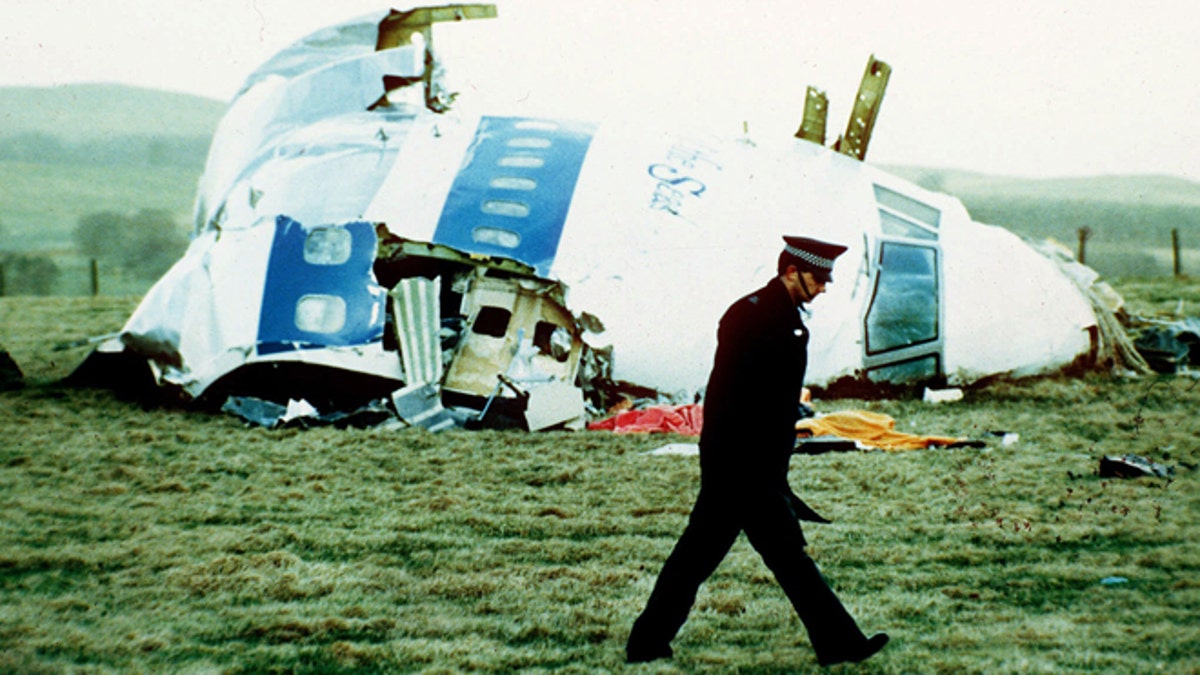
Un policÃa pasa frente a los restos del avión de Pan Am en Lockerbie, Escocia, el 21 de diciembre de 1988. Abdel Baset al-Megrahi, un libio encontrado culpable del atentado donde murieron 270 personas, murió a los 60 años debido al cáncer, se informó el domingo 20 de abril de 2012. (Foto AP/Martin Cleaver, Archivo) (AP/Martin Cleaver)
December 21 marks the twenty-fifth anniversary of the 1988 terrorist bombing of Pan Am Flight 103 over Lockerbie, Scotland. Two hundred seventy innocent lives – 189 of them Americans (until 9/11 this represented the largest number of civilians murdered by terrorists) were lost. Just shy of three years later the U.S. and U.K. governments simultaneously indicted two Libyan Intelligence Officers – Abdel Baset al-Megrahi and Lamin Khalifah Fhimah – for their role in the bombing.
With the collapse of the Soviet Union in December 1991, the U.S. and U.K. were able to push three Resolutions through the United Nations’ Security Council that imposed various sanctions, required Libya to surrender its two nationals and pay “appropriate compensation.”
Al Megrahi and Fhimah remained at large for eight years until an agreement was reached to have both men tried in the Netherlands before a specially authorized court. Libya had three conditions: the men could not be interviewed, no one else in Libya would be sought for the bombing and the trial would have to be before three Scottish judges without a jury.
[pullquote]
Following proceedings held over 36 weeks, and evidence from 230 witnesses, the Court announced in January 2001 that it had reached unanimous verdicts: Fhimah was acquitted, and Al Megrahi was guilty. A life sentence was imposed upon Al Megrahi, with parole eligibility in 27 years (the equivalent of ten months per victim).
There are still, even after 25 years, those, including myself, who have questions surrounding the full extent of who perpetrated the bombing of Pan Am 103.
I have spent more than 20 years representing families of the victims of this tragedy, and was part of the legal team that filed the first civil lawsuit against Libya in 1993. And its personal: Two of my schoolmates in the class behind me at the University of Rochester (N.Y.) were among those killed.
While the civil lawsuit achieved an unprecedented settlement of $2.7 billion dollars I have always regretted that we never uncovered any new facts. Significant world changes now lead me to question what, if anything, the U.S. and U.K. governments are doing to seek justice for the victims and their families.
For example, what role, if any, did Iran or Syria play in the bombing? It cannot be ignored that just five months earlier, a U.S. warship accidentally downed Iran Air Flight 655 with 290 casualties.
Iran swore revenge. Was the Palestinian Front for the Liberation of Palestine – General Command, a radical offshoot of the PLO and whose members operated in Syria – some of whom were swept up in a German raid in October 1988 in the midst of planning to bomb U.S. airlines with a radio device similar to that which ultimately destroyed Pan Am 103 -- involved in some way? Was Libya, whose involvement I do not question, given the “contract” after others had failed?
The 2012 death of convicted murderer Al Megrahi, who had secured a still highly controversial “compassionate” release for prostate cancer in 2009 when he allegedly had only 6 months to live, left Fhimah conceivably possessing the answers alone.
Or is that true?
Few believe that such an overt attack on a U.S. commercial airline would have happened without the personal approval of Libya’s then leader Muammar Qaddafi and other senior Libyan government officials.
When the Libyan people began to revolt in early 2011, the U.S. and NATO provided assistance to the rebels. Qaddafi was killed by his own people on October 20, 2011.
His son, Saif, is now awaiting trial in Libya. As is Abdullah Senussi, Gaddafi’s brother-in-law and former Intelligence Chief at the time Pan Am 103 was bombed.
These men are in the hands of a Libyan government we supposedly call our ally now.
And what about Mousa Kousa, Libya’s Intelligence Chief from 1994 – 2009 (and an intelligence officer in 1988), who fled to the U.K. on March 30, 2011? Scottish authorities reportedly interviewed him about Pan Am 103, but then he was allowed to settle in Qatar.
The change in Libya seemingly offers so many possibilities. Given that Fhimah’s criminal indictment in Washington, D.C. remains technically alive, was there any effort to capture him or seek his surrender?
Did the U.S. government negotiate for access to or even take relevant intelligence files while Qadaffi’s regime collapsed around him? Did U.S. authorities interview Kousa or seek access to Senussi?
So many questions with so little time, as each passing year sees more surviving family members join their murdered loved ones.
Twenty-five years is too long to wait for justice to be fully achieved. Unless there are new criminal charges forthcoming, the U.S. and U.K. governments should tell us what they know. At least this would achieve some additional closure and justice for the Pan Am 103 victims and families.








































